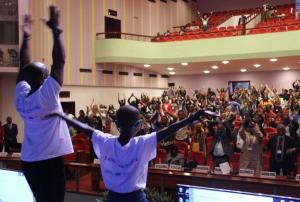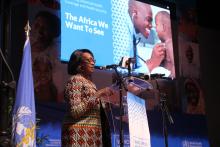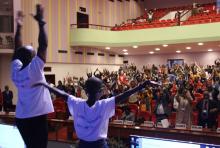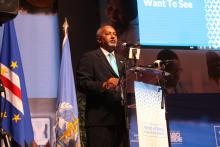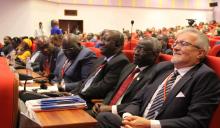WHO Africa Health Forum closes with a road map to achieving universal health coverage and health security
Praia, Cabo Verde, 28 March 2019 – The second World Health Organization’s (WHO) Africa Health Forum culminated today with a road map that governments in the region as well as partners should urgently implement to manage and mitigate Africa’s health needs.
Hosted by the Government of the Republic of Cabo Verde and WHO and seeking new ideas and challenging questions under the theme “Achieving Universal Health Coverage and Health Security: The Africa We Want To See”, the Forum underscored the central role of good health in the sustainable development of the continent.
Participants ranging from high-ranking government officials to youth representatives and from United Nations officials to private sector representatives came together over the three days to explore how to take universal health care and health security to the next level.
In his closing address, H.E. José Ulisses de Pina Correia e Silva, Prime Minister of the Republic of Cabo Verde, said: "In several countries of the world, particularly in Africa, universal health coverage and health security are challenges to be overcome. With strong political and civic awareness, engaged leaderships, good partnerships for development, favourable conditions for investment and for private activity in the health sector and better regulation, we will overcome these challenges."
Dr Matshidiso Moeti, WHO Regional Director for Africa, noted the need for an African perspective on universal health coverage: “We must recognize the specific needs of the region and prioritize innovative service delivery approaches that will result in a long-term impact and lead to our common goal of quality health care for everyone, everywhere.”
As part of the closing ceremony, Cabo Verde Minister of Health and Social Security, H.E. Dr Arlindo Nascimento do Rosário, unveiled a list of recommendations that powerfully conveyed the next steps that Member States especially but also NGOs, development partners and private sector stakeholders should take to heart to deliver the health care systems that Africa needs and deserves.
To take universal health coverage to the next level, the recommendations call for faster action in building stronger, more resilient national health systems, the prioritizing of primary health care, ensuring that vulnerable groups are reached, the strengthening of public-private partnerships and greater, more efficient, investment.
Greater preparedness and prevention of disease outbreaks and other public health emergencies as well as preparedness for detecting and responding when they do occur and preparedness for the impact of natural disasters formed the core of recommendations for health security. The full implementation of the International Health Regulations, which cover the capacity standards for all countries in preventing and responding to acute public health risks, needs to be accelerated, with cross-border collaborations strengthened.
Crucial for improving both universal health coverage and health security are public-private partnerships. In addition to the financial and technical support possible through such partnering, the recommendations emphasized the essential role of the private sector in harnessing and scaling up innovations for universal health care delivery.
WHO will work with governments, civil society and other partners to track the progress the region makes towards universal health care and improved health security.



